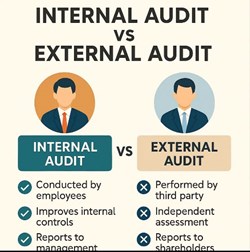What Are the Key Differences, Pros, and Cons of Internal Audit Versus External Audit?

What Are the Key Differences, Pros, and Cons of Internal Audit Versus External Audit?
Audits are essential tools that help businesses ensure transparency, accuracy, and regulatory compliance. Two primary types of audits are internal audits and external audits. While both are crucial, they serve different purposes and have distinct characteristics. Understanding the key differences, advantages, and disadvantages of each can help businesses decide which audit approach best fits their needs.
Key Differences Between Internal Audit and External Audit
Internal audits are typically conducted by a company’s own employees or an internal audit department. The main objective of internal audits is to evaluate and improve the effectiveness of internal controls, risk management, and governance processes. They provide continuous insight into the company’s operations, helping identify risks and opportunities for improvement. Internal audits are ongoing or periodic and usually report to the management or audit committee.
On the other hand, external audits are carried out by independent third-party auditors who are not part of the company. Their primary focus is to provide an unbiased opinion on the accuracy and fairness of the company’s financial statements. External audits are usually annual and report to the company’s shareholders and regulatory authorities, ensuring compliance with financial reporting standards and legal requirements.
Pros and Cons of Internal Audit
Internal audits offer the advantage of ongoing assessment and timely identification of potential risks and control weaknesses. Because internal auditors are employees, they often have in-depth knowledge of the company’s operations and can provide practical recommendations for improvements. However, since internal auditors work for the organization, their independence might sometimes be questioned, and their scope can be influenced by management priorities.
Pros and Cons of External Audit
External audits bring the benefit of complete independence and objectivity, which enhances the credibility of financial statements to investors, lenders, and regulators. They provide assurance that the company’s financial reporting is free from material misstatements. The downside is that external audits are typically conducted less frequently and might miss ongoing operational issues. They can also be costly, especially for smaller businesses, and focus more narrowly on financial accuracy rather than operational improvements.
Conclusion
Both internal and external audits play complementary roles in strengthening a company’s financial health and operational efficiency. Internal audits provide continuous monitoring and help improve internal processes, while external audits offer an independent verification of financial integrity. Together, they contribute to robust business governance and stakeholder trust.
At Citta CPA in Calabasas, CA, we offer expert internal and external audit services designed to meet the unique needs of your business. Our dedicated team ensures thorough audits with actionable insights, compliance assurance, and enhanced transparency to support your growth and success.
Searching for Financial & Taxation Services? Let’s make your search simple with professionals!
Take your Financial & Taxation Services to the next level with Sulekha. Boost your online visibility, connect with more clients, and grow effortlessly!
Blogs Related to Financial & Taxation Services

Income Tax Preparation 2025: A Complete Guide to Filing Smart and Saving More
Income Tax Preparation 2025: A Complete Guide to Filing Smart and Saving More As the 2025 tax season approaches, effective income tax preparation

A Complete Guide to Incorporation Services for New Business Owners
A Complete Guide to Incorporation Services for New Business Owners Starting a new business is an exciting journey, but one of the most important early steps is incorporation. Incorporation not only provides legal recognition but also offers protecti

International Taxation: The Basics and What You Need to Know
International Taxation: The Basics and What You Need to Know In today's global economy, international taxation has become a critical area for businesses and individuals engaged in cross-border activities. Understanding the basics of international ta

How to Create an Effective Business Tax Plan for 2025
How to Create an Effective Business Tax Plan for 2025 Creating an effective business tax plan for 2025

7 Tax Planning Strategies for 2025: Personal Tax Tips and Types of Tax Planning Explained
7 Tax Planning Strategies for 2025: Personal Tax Tips and Types of Tax Planning Explained Tax planning is a vital part of personal financial management, especially as we head into 2025. Effective tax planning allows individuals to minimise their tax

Active vs Passive Investment Management Performance in 2025: Key Insights and Trends
Active vs Passive Investment Management Performance in 2025: Key Insights and Trends Understanding the performance differences between active and passive investment management in 2025




